#john arlott
Explore tagged Tumblr posts
Text
Context for choice 2. Arthur insists John stays at the ranch with his family while he, Charles and Sadie take care of Micah and Arthur takes John's place in hunting down Bill, Javier and Dutch. And Arthur sacrifices himself to save The Marstons and Uncle.
#Red Dead Redemption#Red Dead Redemption 2#Charthur#Sadithur#Arlotte#Marthur#Arthur Morgan#Arthur x Mary#Mary Gillis Linton#John Marston#Abigail Marston#Jack Marston#Charles Smith#Sadie Adler#Charlotte Balfour
46 notes
·
View notes
Text
The VAs behind Avatar's voice
I was playing World Tour and for some reason I never really put too much thought into my Avatar's voice, and who the ENG VA was.
And it got me thinking about the other Avatar's voices that made an appearance, and who they were. Surprisingly, I have heard the Eng VAs in different medias before.
Hopefully, this can help people hear what their OCs sound like, instead of hearing bits and pieces from the game.
1. Voice 1 Age (Juvinelle) Tone (High) - Zach Aguilar

They voice Tanjiro Kamado (Demon Slayer), Arthur Pendragon (Seven Deadly Sins), David (CyberPunk: Edgerunners), Genos (One Punch Man), Colt (Hunter x Hunter), Koichi (JJBA Diamond is Unbreakable), Expresso Cookie (Last Cookie Standing) etc.
2. Voice 2 Age (Young) Tone (High) - Xanthe Huynh

They voice Alluka Zoldyck (Hunter x Hunter), Marianne von Edmund (Fire Emblem Warriors: Three Hopes), Nadja Liones (The Seven Deadly Sins: Dragon's Judgement), Ui Hirasawa (K-ON!!), Sachi (Sword Art Online), Meiko "Menma" Honma (Anohana) etc.
3. Voice 3 Age (Young) Tone (Normal) - KIMO Leopoldo
Made a separate post for KIMO here.
4. Voice 4 Age (Young) Tone (High) - Kimberly Woods

They voice Hinaki Ubuyashiki and Naho Takada (Demon Slayer), Marisa (Eiyuden Chronicle: Hundred Heroes), Shard (X-Men '97), Little Sister Machine and No. 4 (Nier: Automata Ver1.1a), Hassan of the Serenity (Fate/Grand Order The Movie Divine Realm of the Round Table) etc.
5. Voice 5 Age (Young) Tone (Deep) - J. Michael Tatum

They voice Kyoya Otori (Ouran High School Host Club), Scar (Full Metal Alchemist: Brotherhood), France (Hetalia), Sebastian Michaelis (Black Butler), Nagi Kengamine/Owl (Deadman Wonderland), Tomoe (Kamisama Kiss), Erwin Smith (Attack on Titan) etc.
I definitely recommend checking him out, he voices a lot of characters I didn't even know were the same person.
6. Voice 6 Age (Young) Tone (Normal) - Amber Lee Connors

They voice B. Jenet (Fatal Fury), Rye Cookie (Last Cookie Standing), Sachiko Juraku (Kakeguri Twin), Kurumi Saijo (Wonder Edd Priority), Pieck Finger/Cart Titan (Attack on Titan), Mei Mei and Nagi Yoshino (Jujutsu Kaisen), Furina (Genshin Impact), Miki Kawai (A Silent Voice) etc.
7. Voice 7 Age (Young) Tone (Deep) - John Patneaude

They voice Quatre Salision (The Legend of Heroes: Trails through Daybreak), Renault (Unicorn Overlord), Rei (Pokemon Masters), and Arlott (Mobile Legends: Bang Bang).
8. Voice 8 Age (Young) Tone (Normal) - Dawn M. Bennett

They voice Juvia Loxar (Fairy Tail), Sister Lily (Black Clover), Frieda Reiss (Attack on Titan), Setsuna Tokage / Lizardy (My Hero Academia), Yukong (Honkai: Star Rail), Charlotte Smoothie, Poppy, Olive, Kairen, Elmy (One Piece) etc.
9. Voice 9 Age (Young) Tone (High) - Alejandro Saab

They voice Kaigaku (Demon Slayer), Leon (Pokemon Journey), Cyno (Genshin Impact), Izumi Miyamura (Horimiya), Yukio Kasamatsu (Kuroko's Basket), Macaque (Monkie Kid), Terunori Kuga (Food Wars!), Haru Kohno, Masamichi, Gozo Murobuchi (Kengan Ashura) etc.
10. Voice 10 Age (Young) Tone (High) - Ryan Bartley

I use this one! :0
They voice Komugi (Hunter x Hunter), Tsubomi Takane (Mob Psycho 100), Pompompurin (Hello Kitty and Friends Supercute Adventures), Ram (Re:Zero), Rei Ayanami (Neon Genesis Evangelion) and so much more.
11. Voice 11 Age (Mature) Tone (Deep) - Jordan Reynolds

They Voice Siegfried (Granblue Fantasy), Ludociel (Seven Deadly Sins), Tiziano and Carne (JJBA: Golden Wind), Ingo (Pokemon Masters), Jin Wong (Astral Chain) etc.
12. Voice 12 Age (Mature) Tone (Normal) - Larissa Gallagher

They voice Lagoona Blue (Monster High), Bluebird (Steven Universe: Future), Lola Michisato (Komi Can't Communicate), Fine (Vampire in the Garden), Miss Pastel, Koala Princess, Demon Queenie, Sara (OK K.O.! Let's Be Heroes) etc.
13. Voice 13 Age (Mature) Tone (Deep) - Jason Marnocha

They voice Kirin Jodo (Mob Psycho 100), Demon King (Seven Deadly Sins), Olaf and Haldor (Vinland Saga), Katana man (Chainsaw Man). Charlotte Oven (0ne Piece), Keicho Nijimura (JJBA: Diamond is Unbreakable) etc.
14. Voice 14 Age (Mature) Tone (Deep) - PJ Mattson

They voice Baiken (Guilty Gear Strive). Herta (Honkai: Star Raill), Catwoman / Selina Kyle (Mortal Kombat vs DC), Cheer Bear (Care Bears), Locksley Longhair and Ferns (Barbie: Dreamtopia), etc.
15. Voice 15 Age (Mature) Tone (Deep) - Doug Stone

They voice Hugh Islands and Grandfather Bernadotte (Hellsing Ultimate), Psycho Mantis (Metal Gear Solid), Lin (Ghost in the Shell), Dr. Kuseno (One Punch Man) Adolf and Foss (Berserk), Gorm (Vinland Saga) Gilbert Pronislav and Duke Aegir (Fire Emblem) etc.
16. Voice 16 Age (Mature) Tone (Normal) - Ellyn Stern

They voice Masaki Kurosaki (Bleach), Okumoto (Belle), Haraway (Ghost in the Shell), Veronica Vera (Shadow Hearts: Covenant), Tomiko (Hajime no Ippo), Okami (Skip Beat!) Agatha (Pokemon Generations) etc.
#street fighter#street fighter 6#sf x reader#sf6 x reader#street fighter x reader#sf6#sf#street fighter oc#street fighter avatar#street fighter 6 avatar#street fighter 6 x reader#street fighter 6 oc
25 notes
·
View notes
Text
Willow even in the remote days of the Hambledon Club was the wood chosen for bat making. There is no known substitute; but the quality of the trees varies considerably, while much depends upon the way the wood is seasoned. In these times white willow is preferred by most players to the red from which the old cricketers, down to the later stages of Dr W. G. Grace's career, obtained their scores.
"Arlott and Trueman on Cricket", by John Arlott and Fred Trueman, discussing the preference for white willow as the wood for making cricket bats (hence the soothing sound of 'leather on willow' crackling over the radio in summer).
The most famous white willow species used for cricket bats is now Salix Alba Caerulea, but Kashmir willow is also widely used.
Here's Australia's Don Bradman demonstrating some shots, because even though this post is about trees, cricket has hijacked it
0 notes
Note
Hi there!
I am so intrigued by your Arlotte fic, “Fearless”. It’s such a unique idea. Kinda reminds me of Twilight Zone meets Poe meets RDR.
Can I ask where you got the inspo/idea from?
Hey! Ahh, I'm still so thrilled you're enjoying the story! ❤️
The inspiration for Fearless actually came from a combination of things I love—first and foremost the “Monkey’s Paw”/Faustian deal tropes, which are some of my absolute favourites (additional shout-out to the Hearts of Stone expansion from The Witcher 3, which did this trope extremely well!). Since the Strange Man draws similarities to entities in those stories, I figured it wouldn’t be out of place for him to offer a similar deal to Arthur. He already made one deal, canonly, with a man on the brink of death after a betrayal by his gang (the Bluewater John blood money missions from RDO), so it seemed in his character to seek out those sorts of deals – and Arthur seemed exactly the sort of “let’s ride this out and see where it goes” kind of person who might not wholly believe a deal like that to be real until it actually came back to bite him.
(Let’s be real, a deal with the Devil is not the weirdest thing he can encounter in-game and shrug off. “Unshaken” is a bit of an understatement for his character, all things considered.)
Second – gothic literature was extremely popular around that era, so with certain elements of the game leaning into it already (the St. Denis vampire reminiscent of Dracula, the Man-Made Mutant a throwback to Frankenstein) it seemed thematically fitting to make the story tie intrinsically into a gothic literary theme. Only two chapters have been posted to AO3 yet of course so it’s only getting started, but this theme does carry heavily throughout the current outline!
Third – I am extremely soft for stories about people getting a second chance at love, characters who are a little more reserved, a little more world-weary than the young green protagonists who often get to fall in love in most stories. As I mentioned to another reader: I just feel like Arthur and Charlotte are so perfect for one another—both taken out of their element by love, and subsequently hurt by it, but in extremely different ways. Both are wounded by the unfairness of the world, both still need time to heal, and both can see that the other is an advocate for them in that journey to healing, even if they themselves would never have thought to pursue it for their own happiness – they’ll do it for someone else, like everything else they’ve ever done.
I apologize for rambling your ear off, this is a lot of fun to talk about! Thank you again so much for reading the fic and asking about it! This has really made my night :D ❤️
1 note
·
View note
Photo
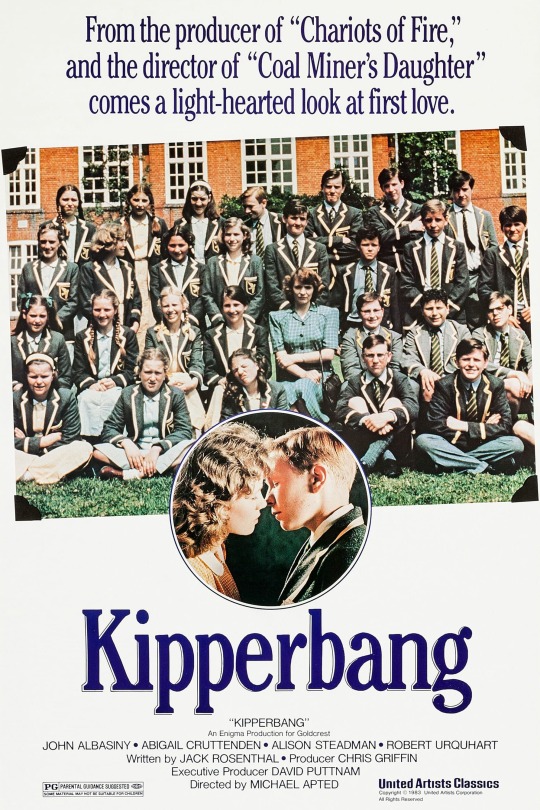
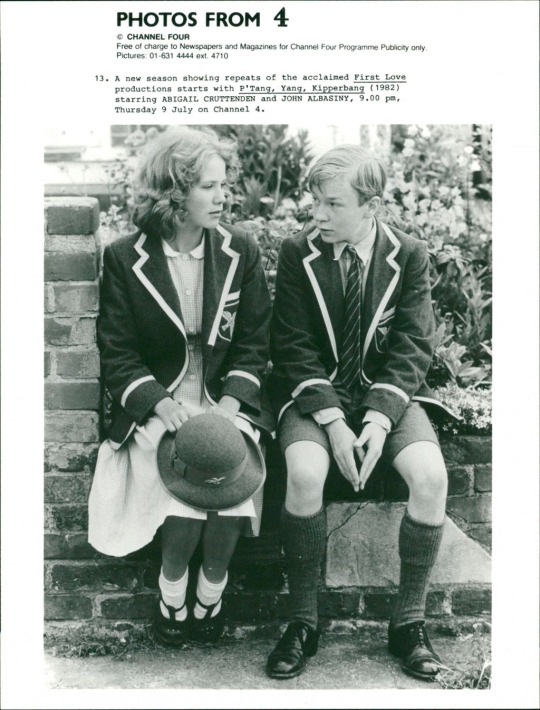
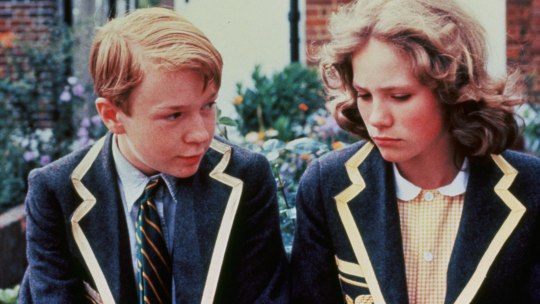
P’tang, Yang, Kipperbang (1982) Michael Apted
August 20th 2022
#p'tang yang kipperbang#1982#michael apted#john albasiny#abigail cruttenden#alison steadman#mark brailsford#christopher karallis#garry cooper#maurice dee#robert urquhart#frances ruffelle#john arlott#first love: p'tang yang kipperbang#kipperbang
8 notes
·
View notes
Quote
We are faced with Australian batting, bowling, fielding, captaincy and Australianism. Australianism means single minded determination to win - to win within the laws, but, if necessary, to the last limit within them.
John Arlott, Concerning Cricket (1949), essay titled “Australianism.”
2 notes
·
View notes
Text
John Arlott
---
This the fanciful engraver might
In his creative dream have seen,
Here, framed by summer's glaring light,
Grey stone, majestic over green
#poetry#poem#john arlott#fanciful#engraver#might#creative#dream#framed#summer#glaring#light#grey#stone#majestic#green
3 notes
·
View notes
Text
OTP Songs
I have more but here’s the ones that stand out to me:
Cullen Rutherford and Lydia Trevelyan from Dragon Age: “Only Us” from Dear Evan Hansen
Connor and Sophie from Detroit: Become Human: “Your Song” by Elton John (Alternatively “Play Me” by Neil Diamond.
Arthur Morgan and Charlotte Balfour from Read Dead Redemption: “Harvest Moon” by Neil Young
#arlotte#cophie#cullydia#and braime is woman by john lennon#dont ask why I did this#just procrastinating writing
3 notes
·
View notes
Text

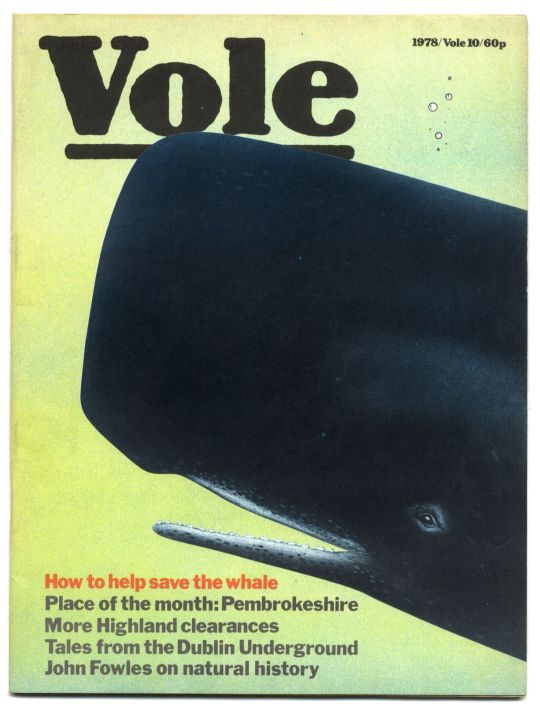

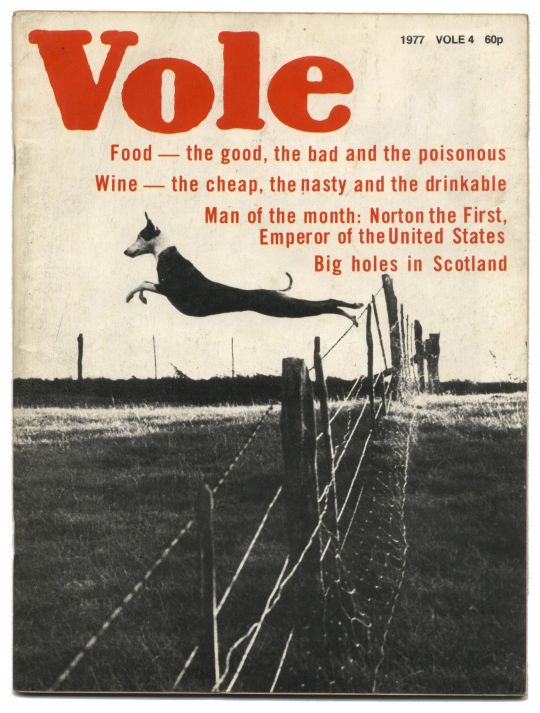



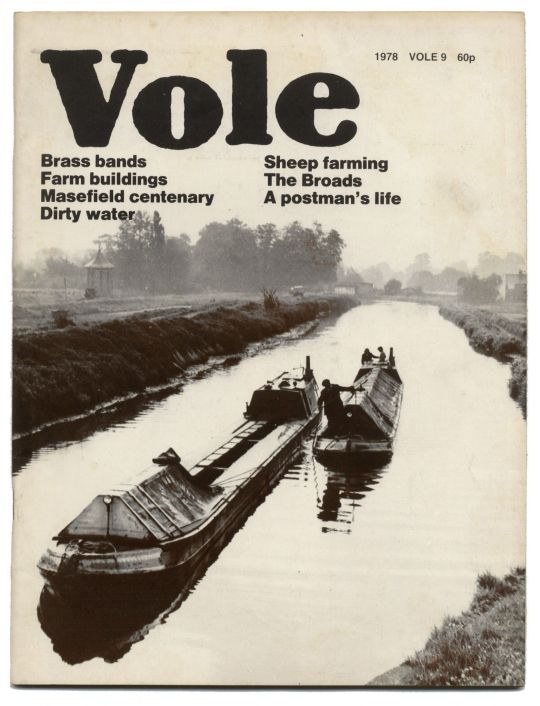
Above: An undated note by George Harrison in which he agrees to put money towards funding Vole magazine, after presumably being asked for help from Terry Jones in a letter, Below: Various issues of the magazine
NOTE: Vole was a lighthearted environmental magazine founded by journalist and anarchist Richard Boston with funding from Terry Jones. Contributors included people like Richard Mabey, Richard Adams, Tony Benn, John Arlott, and Paul Foot (the journalist). It ran from 1977-1981.
"During 1980, Harrison became a member of Greenpeace and CND (Campaign for Nuclear Disarmament); [9] he also protested against the use of nuclear energy with Friends of the Earth, in London, [10][11] and helped finance Vole, a green magazine launched by Monty Python member Terry Jones." - Wiki page for Save the World
"According to a publicity handout at the time, VOLE was in favour of ‘canals, railways, shove ha’penny, old buildings, mushrooms, civil rights, cycling, recycling, allotments, blue-tits, wagtails, oak trees, voles, conservation, alternative technology, small businesses, village schools, yards, feet and inches, rights of way, local history, human welfare, Basil Brush and darts’." - Caught by the River
#george harrison#terry jones#monty python#richard boston#vole magazine#vole#save the world#greenpeace#spuds rule OK#politics#1970s#1980#1980s#one of those things i wish there was more information about#George letter
34 notes
·
View notes
Note
Hi 😊 not sure if you’re still taking requests but if so could I please request some Arlotte Valentine’s Day headcanons please??
This is rather late and I just updated my request rules today, but I've decided that at least for the moment, the only non-wlw pairing I'm gonna be writing for is John/Abigail.
I'm a lesbian, and it's really hard for me to write men and women in romantic relationships, and I honestly just don't really enjoy doing it. It feels more like a chore than something I actually have fun with, y'know?
Sorry to disappoint, but I hope you can undersand :/
3 notes
·
View notes
Photo
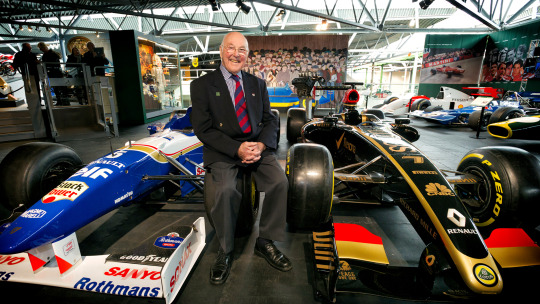
I don't make mistakes. I make prophecies which immediately turn out to be wrong.
- Murray Walker, BBC commentator and the ‘Voice of Formula One’
Murray Walker, otherwise known as the ‘Voice of F1’, was a BBC commentating legend from 1976 to 1996 before joining rivals ITV in 1997, where he stayed for a further five years.
Seldom can any frontrank outside-broadcast commentator have had a longer span at the microphone, or a voice more distinctively identifiable with their sport, than motor racing’s Murray Walker.
In British broadcasting lore John Arlott’s rural burr will always remain redolent of cricket’s roots in the village green, just as Dan Maskell’s creamy courtside whisper was homage to the leisured grace of the suburban tennis club, and Bill McLaren’s Borderer’s brogue forever implied the blazered probity of olde-tyme amateur “rugger”.

So, at grand prix time for bikes and cars, for more than half a century, the passionate yawp and yowl emanating from Walker’s commentary box was an almost onomatopeic accompaniment to the snarling beasts hurtling past at 200mph. It may have been high-octane noise, but the descriptions were also skilled and professionally accomplished.
On both radio and television, Walker’s florid “pants on fire” commentaries were heard across seven decades. The first grand prix he described live was for BBC “wireless” at Silverstone in 1949 (won by Baron Toulo de Graffenried’s Maserati 4CLT). His last live commentary of a grand prix was in 2007 for BBC radio, when he was 83.
In all, Walker covered more than 350 Formula One grands prix, more than 200 Isle of Man TT and senior Manx motorcycling events, and countless other categories from powerboat races to motocross and speedway. For well over half a century, if noisy motor sport was broadcast, you could pretty much guarantee that Walker’s decibels were attempting to drown it out in his valiant efforts to enhance the narrative and embellish the scene. But it was not without cost. Years of exposure to the din left him with hearing loss in both ears.
While his stimulating ebullience was appealing to (most) cognoscenti petrolheads, a wider audience fondly enjoyed the commentator’s accompanying torrent of tautologies and full-spate sophistries, his “Murrayisms”, as he called them. Most outside broadcasters are embarrassed by (or flatly deny) their reported heat-of-the-moment bloopers, but Walker happily revelled in, and nurtured his. “Far too often I’d operate mouth before engaging brain,” he would admit, “but the action in front of me was always happening at such a lick.”
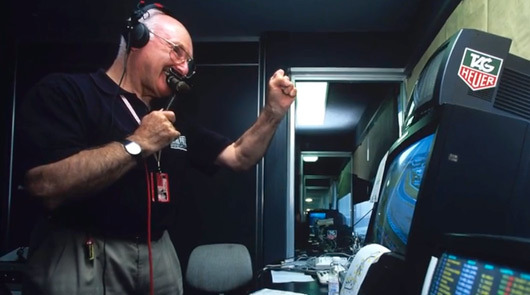
The good ol’ trouper knew, too, that happily confessed horse’s-mouth recitation of these touching gaffes not only saved the bother of a freshly minted script each time, but also handsomely enhanced his fees on the lucrative after-dinner circuit.
You need to squawk for the full effect:
“This leading car is absolutely unique – except, of course, for the one immediately behind it, which is identical.”
“Mansell’s now totally in front of everyone in this race, except the two in front of him.”
Michael Schumacher on the Monaco GP grid: “There are seven winners of the Monaco Grand Prix on the grid today and four of them are Michael Schumacher.”
Nigel Mansell putting in a lap: “Nigel Mansell is slowing down now, he is taking it easy. Oh no he isn’t! It’s a new lap record!”
Pedro Diniz’s fire in Argentina: “There’s nothing wrong with the car except that it’s on fire.”
“How you can crash into a wall without it being there in the first place is beyond me!”
But what F1 fans remember best: “It’s go, go, go!”
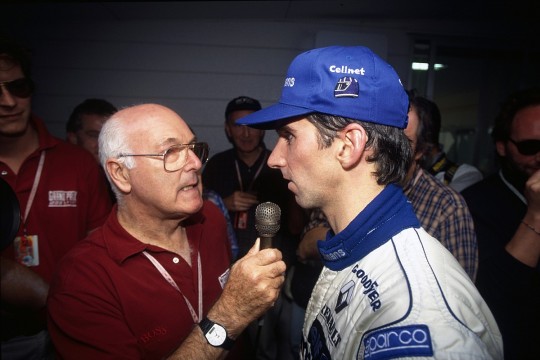
Murray Walker was born in 1923 in Birmingham, England. Walker had a happy childhood and was proud of his roots. Walker was conscripted into the armed forces and passed out as an army officer from the Royal Military College in Sandhurst. Murray was commissioned in 1942 into the Royal Scots Greys, achieving the rank of captain. He helped make the push from Normandy to the Baltic. He would command a Sherman tank in the Battle of the Reichswald with the 4th Armoured Brigade before leaving the Army as a captain.
Upon demobilisation, went into advertising, a career which, on its own, might have made him worthy of note. Trying to find his place in the world, he studied shipping management before being employed as an accounts director by the Masius agency, where he was in charge of the Mars project which came up with the famous slogan ‘A Mars a day helps you work rest and play’.
Although he continued working in advertising, once again Walker broadened his horizons when, in 1948, he made his first public broadcast at Shelsley Walsh Hillclimb. A year later and he was commentating for BBC radio on the British F1 Grand Prix.
He established himself as the BBC’s chief motorcycling commentator before going into F1 full-time from 1978. However, even then Walker continued to dabble in other series, from the British Touring Car Championship to motocross and Macau.

It was his partnership with James Hunt at the BBC though which cemented Walker’s place in commentating history, as he brought the breathless passion and excitement which proved the perfect foil for Hunt’s dry wit and in-depth knowledge.
Walker remained with the BBC through to 1996 with Jonathan Palmer stepping up following Hunt’s death. But with F1’s television rights going to ITV in 1997, so too did Walker. This time it was former racer turned commentator Martin Brundle who brought the F1 know-how to Walker’s ‘Murrayisms’.
He retired from full-time commentating in 2001. After he ended his regular Formula One commentaries, Walker continued to appear on television for a number of years afterwards, mainly on magazine programmes but occasionally commentating on less high-profile motorsport events. Acknowledging the partial deafness he had developed over the years, in 2006 he became an ambassador for the David Ormerod Hearing Centres, and campaigned to help people understand the importance of frequent hearing tests.
On Saturday, March 13, 2021, the British Racing Drivers’ Club announced the sad passing of Murray Walker at the age of 97.
RIP Murray Walker.

F1 commemorate Murray Walker at the Bahrain Grand Prix 2021
#murray walker#walker#quote#sports#motorsports#racing#driving#formula one#grand prix#british#royal scots greys#sandhurst#BBC#commentator#james hunt#icon
25 notes
·
View notes
Text
Balaeniceps rex

By Olaf Oliviero Riemer, CC BY-SA 3.0
Etymology: Whale Head
First Described By: Gould, 1850
Classification: Dinosauromorpha, Dinosauriformes, Dracohors, Dinosauria, Saurischia, Eusaurischia, Theropoda, Neotheropoda, Averostra, Tetanurae, Orionides, Avetheropoda, Coelurosauria, Tyrannoraptora, Maniraptoromorpha, Maniraptoriformes, Maniraptora, Pennaraptora, Paraves, Eumaniraptora, Averaptora, Avialae, Euavialae, Avebrevicauda, Pygostaylia, Ornithothoraces, Euornithes, Ornithuromorpha, Ornithurae, Neornithes, Neognathae, Neoaves, Aequorlitornithes, Ardeae, Aequornithes, Pelecaniformes, Balaenicipitidae
Status: Extant, Vulnerable
Time and Place: Within the last 10,000 years, in the Holocene of the Quaternary


The Shoebill is known from eastern central Africa

Physical Description: There is no other dinosaur quite like the Shoebill. It is one of the most visually distinctive creatures, with traits monstrous and familiar that make it difficult to really understand exactly what you’re looking at. They stand up to 140 centimeters in height, which yes, is the height of a human being on the shorter side. They can even reach 152 centimeters tall - the same height as a 5 foot tall person. They have very long, skinny legs, with giant toes on their feet that are widely splayed out. Their bodies are huge, with short tails and bulky torsos. Their backs are grey, and their belly feathers are white. Their necks are a lighter grey, and there is some dark speckling all over their wings and right beneath their necks. Their heads continue that light grey coloration, and have small tufts of feathers as a crest on the back of the head. Shoebills also happen to feature yellow, unblinking, perfectly circular eyes, which is unsettling at best. They have heavy eyebrows of feathers over their eyes, giving them a look like they’re always glaring at you - which is even more disconcerting considering the giant, wide, scoop-shaped bill that the Shoebill is named for. The bill is orange, and ends in a small hook, just in case you weren’t terrified enough.
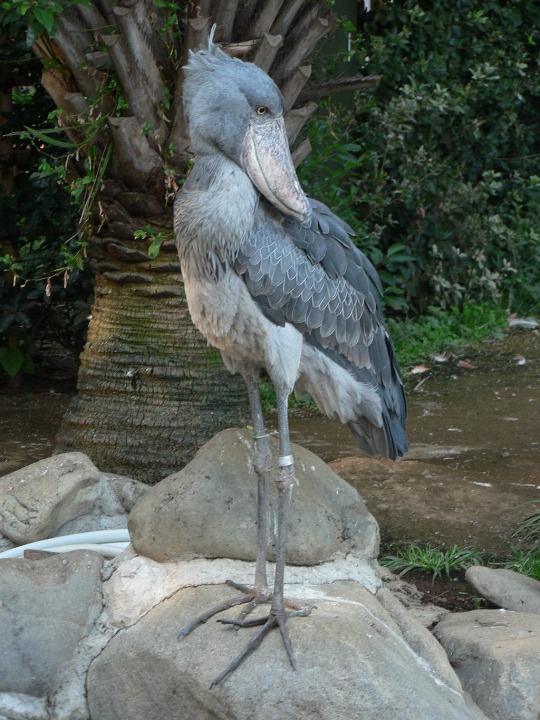
By Peter Halasz, CC BY-SA 2.5
Diet: Shoebills feed mainly on fish - especially lungfish, though most large fish are acceptable. Amphibians, young crocodilians, water snakes, rodents, and young waterfowl are also fed upon by these giant terrifying creatures.
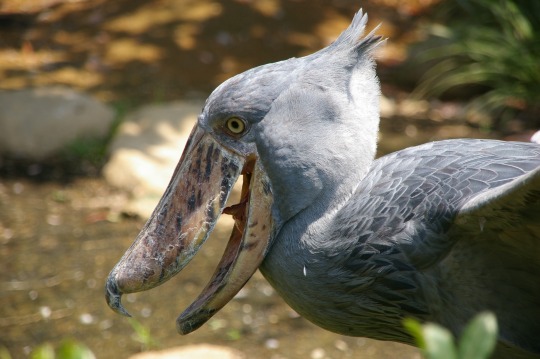
By Snowmanradio, CC BY-SA 2.0
Behavior: Shoebills are calculating bastards - they’ll hover around lakesides and swamps with low oxygen in the water, which forces lungfish to come up to breathe - so that the Shoebill can then lean down and scoop them up. They are loners during the hunt, carefully taking each step as they make sure to not sink too far into the mud and weeds where they live. Their lunging after food is hard to miss - their mouths open wide, revealing how huge those bills really are, and giving it a sinister smile. These lunges are usually startling, as the Shoebill is usually still for a very long time before it goes after prey. It is as if a statue had suddenly come to life. This is especially disconcerting when the Shoebill opts for standing on floating vegetation - just casually going down with the current as though they were a giant Jacana. They tend to defend territories for food, at least somewhat, not coming closer than twenty meters to another Shoebill during feeding. They don’t sense their prey with feel, but entirely by sight - making them very unblinking and focused, adding to their strange aura. Shoebills are also usually silent, which just makes their entire aesthetic even more terrifying. When they do dare to make sounds, they make very raucous cries - usually while they fly.

By Petr Simon
Yes, yes they can fly. Shoebills are some of the largest flighted birds today, which does not help. They hold their wings flat, pulling in their necks to their bodies to aid in making their flight more efficient. They have some of the slowest flaps of any bird, at 150 flaps per minute. They fly only a few meters at a time, and usually prefer to glide as much as possible. The farthest any Shoebill as traveled at one time seems to be 20 meters. As such, Shoebills are not very mobile birds, and they usually only move from place to place based on food availability.
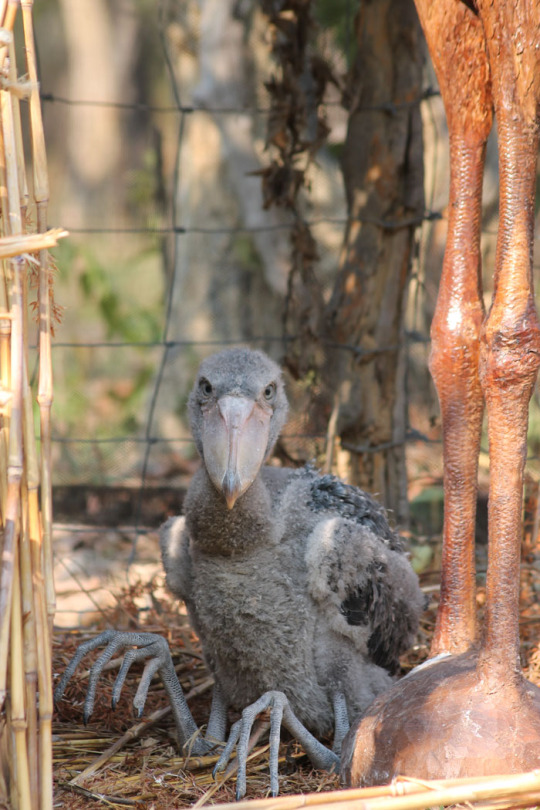
By African Parks/Bengweulu Wetlands Photography
Shoebills begin breeding depending on the water levels of their habitat at a given time. They lay their eggs when the rains begin to end and the waters start to recede; as such, the chicks hatch and fledge late in the dry season. They nest alone, though there are possible reports that they may form some breeding colonies in South Sudan. They make nests out of grass in a mound that is three meters wide, usually placed on a small island or on floating vegetation amongst dense papyrus. They lay two eggs that are incubated for a month. The chickare cute, fluffy, and grey, with tiny regular sized bills. They then fledge a little more than three months later and, what’s more, usually only one chick survives. The chicks and parents will make whining and mewing to each other to get attention and beg for food. Sometimes, the young will make hiccups as begging calls. The parents are constantly with the young for the first forty days of rearing, only briefly leaving to get food and water or nest material. As the chicks age, the parents spend more and more time away, but they still bring food regularly. The chicks, after fledging, remain dependent on the parents for food for a few more years. They reach reproductive age at around three to four years. Displays often including mooing and bill clattering, which can be accompanied by the shaking of the head from side to side, which is quite the undertaking for a bird with such a large head. Breeding pairs stay together for the season, and break up when the chicks leave the nest. Shoebills can live up to fifty years, which is aided by the fact that they tend to not have predators after reaching full size.
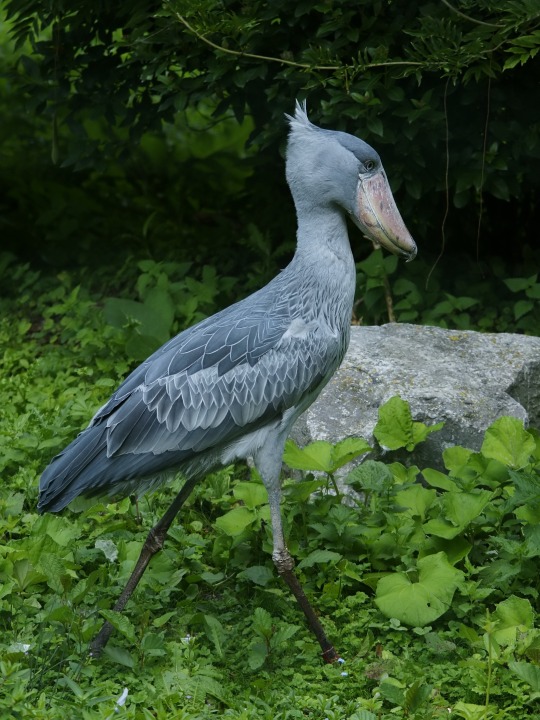
By Hans Hillewaert, CC BY-SA 3.0
Ecosystem: Shoebills stick to marshes, especially papyrus marshes and those with reeds and cattails. They will also gather around marshy lakesides, especially near Lake Victoria. They go wherever they can find floating vegetation to stand upon, including ricefields. They tend to go where animals such as hippopotamus go, since the hippo can dredge up food that the Shoebill can then feed upon.

By Fritz Geller-Grimm, CC BY-SA 2.5
Other: Shoebills are currently considered vulnerable to extinction, with 5000 to 8000 birds thought to be remaining in the wild (though that may be low and there may be as many as 10,000). The reasons for this decline in population is partially due to habitat loss - the Shoebill is dependent on papyrus swamps and other wetland habitats, which are targeted by drainage schemes and other development activities. Animals being brought across these swamps and trampling their young also majorly contributes to population decline. It is a very unique bird and a very popular one, so luckily there are some conservation efforts ongoing, especially in zoos. Some hunting is also contributing to population loss. Despite these conservation efforts, only once has the Shoebill been successfully bred in captivity.
~ By Meig Dickson
Sources under the Cut
Elliott, A., Garcia, E.F.J. & Boesman, P. (2019). Shoebill (Balaeniceps rex). In: del Hoyo, J., Elliott, A., Sargatal, J., Christie, D.A. & de Juana, E. (eds.). Handbook of the Birds of the World Alive. Lynx Edicions, Barcelona.
Guillet, A (1978). "Distribution and Conservation of the Shoebill (Balaeniceps Rex) in the Southern Sudan". Biological Conservation. 13 (1): 39–50.
Hackett, SJ; Kimball, RT; Reddy, S; Bowie, RC; Braun, EL; Braun, MJ; Chojnowski, JL; Cox, WA; Han, KL; et al. (2008). "A phylogenomic study of birds reveals their evolutionary history". Science. 320 (5884): 1763–8.
Hagey, J. R.; Schteingart, C. D.; Ton-Nu, H.-T. & Hofmann, A. F. (2002). "A novel primary bile acid in the Shoebill stork and herons and its phylogenetic significance". Journal of Lipid Research. 43 (5): 685–90.
Hall, Whitmore (1861). The principal roots and derivatives of the Latin language, with a display of their incorporation into English. London: Longman, Green, Longman & Roberts. p. 153.
Hancock & Kushan, Storks, Ibises and Spoonbills of the World. Princeton University Press (1992),
Houlihan, Patrick F. (1986). The Birds of Ancient Egypt. Wiltshire: Aris & Phillips. p. 26.
Jasson, J.; Nahonyo, Cuthbert; Lee, Woo; Msuya, Charles (March 2013). "Observations on nesting of shoebill Balaeniceps rex and wattled crane Bugeranus carunculatus in Malagarasi wetlands, western Tanzania". African Journal of Ecology. 51 (1): 184–187.
Mayr, Gerald (2003). "The phylogenetic affinities of the Shoebill (Balaeniceps rex)". Journal für Ornithologie.
Mikhailov, Konstantin E. (1995). "Eggshell structure in the shoebill and pelecaniform birds: comparison with hamerkop, herons, ibises and storks". Canadian Journal of Zoology. 73 (9): 1754–70.
Muir, Allan; King, C.E. (January 2013). "Management and husbandry guidelines for Shoebills Balaeniceps rex in captivity". International Zoo Yearbook. 47 (1): 181–189.
Stevenson, Terry and Fanshawe, John (2001). Field Guide to the Birds of East Africa: Kenya, Tanzania, Uganda, Rwanda, Burundi. Elsevier Science.
Tomita, Julie (2014). "Challenges and successes in the propagation of the Shoebill Balaeniceps rex: with detailed observations from Tampa's Lowry Park Zoo, Florida". International Zoo Yearbook. 132 (1): 69–82.
Williams, J.G; Arlott, N (1980). A Gield Guide to the Birds of East Africa. Collins.
#Balaeniceps rex#Balaeniceps#Shoebill#Bird#Dinosaur#Birblr#Factfile#Ardeaen#Aequorlitornithian#Water Wednesday#Piscivore#Birds#Dinosaurs#Quaternary#Africa#biology#a dinosaur a day#a-dinosaur-a-day#dinosaur of the day#dinosaur-of-the-day#science#nature
729 notes
·
View notes
Photo

#Repost @vtrakit • • • • • • Thoughtful Quote by John Arlott, OBE 🏏 . . . . #quotestagram #quotes #quoteoftheday #cricketquotes #obe #britain #bbc #commentary #british #cricket https://www.instagram.com/p/B81U9F8h-WD/?igshid=1w45ozt1vrit2
1 note
·
View note
Text
John Arlott: Salty quality of human nature
“Cricket, like the novel, is great when it presents men in the round; when it shows the salty quality of human nature. ” —John Arlott.
View On WordPress
0 notes
Video
youtube
Heroes by David Bowie
From drugs to heroes. Heroes are people who save us, superhumans battling against the gods, achieving impossible success. For a moment, I sat and thought: “Who are my heroes?” and was surprised to think that a hero could be personal and not universally recognised. For some reason, a hero has to have an element of bravery or self-sacrifice. And all of a sudden, I could find no-one who really fits into the true hero category. My parents have strong elements of self-sacrifice (my mother’s total dedication to her supportive role) and bravery (my father’s absurd desire to climb up sheer rockfaces) but my mother was not particularly brave and my father wasn’t sacrificing anything (one day I’ll have to understand the motivation behind any adrenaline-fuelled sports like sky-diving or caving).
Some people are clearly very good at what they do, to the extent that every time they do something, I enjoy it; I am a fan (which makes their mistakes horrible to endure, or their awful real-life personalities doubly embarrassing, like John Cleese, for example, so it doesn’t mean he’s my hero). Sports people like Fred Trueman, as a young boy; I remember reading the biography written by John Arlott, it must have been one of the first really ‘grown-up’ books that I read. There are certain runners who have such beautiful athleticism, I would watch all their races - the first one was Alberto Juantorena and since then Tirunesh Dibaba and now Athing Mu. People who are clever at writing - Martin Amis, Günter Grass, Simon Armitage.
Do I wish I could be them? Would I ever want to be Lionel Messi, Leonardo di Caprio or Angela Merkel? Being really famous is not the definition of being a hero, not that they don’t have elements of that. Nor does being particularly successful. Hero for a day, saving babies from burning buildings, rip-tides or car crashes is a random element, although a career choice of fireman or paramedic is now beyond me. Self-sacrifice and bravery - a bit everyday, perhaps. “How to be Your Own Hero” would be a great title for a self-help manual. I’ll google it.
David Bowie’s second appearance on the list; I owned this album, purchased more out of a sense of trying to be cool than actually enjoying the music. I was never into Bowie at all and plenty of his stuff is well below par, but the good songs are stellar and this one has grown on me over the years; the chugging, pulsing music and the uplifting lyrics is all of a piece.
1 note
·
View note
Text
Observer archive - Alf Ramsey, 28 October 1962
Following Ramsey’s appointment as England football manager, John Arlott explained why it was the ideal appointment, Arthur Hopcraft reported on Everton vs Ramsey’s Ipswich Town, and Ray Green photographed the man and the match.
The Cool Man in Charge by John Arlott
The F.A., this time, has disarmed all reasonable criticism. Alf Ramsey was, from the outset, the ideal manager for the English team. He is not merely a tried and proven expert in football management, he is the right expert, and the right sort of person, for the post. Basically, it matters to him.
Continue reading... https://www.theguardian.com/theobserver/2018/oct/27/observer-archive-alf-ramsey-28-october-1962
1 note
·
View note